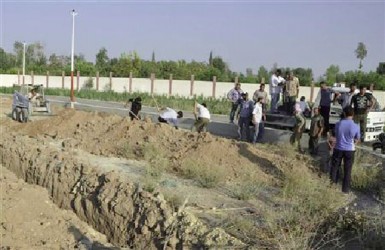BEIRUT/AMMAN, (Reuters) – Syria’s opposition accused government forces of gassing hundreds of people yesterday by firing rockets that released deadly fumes over rebel-held Damascus suburbs, killing men, women and children as they slept.

With the death toll estimated between 500 and 1,300, what would be the world’s most lethal chemical weapons attack since the 1980s prompted an emergency meeting of the U.N. Security Council in New York.
The council did not explicitly demand a U.N. investigation of the incident, although it said “clarity” was needed and welcomed U.N. chief Ban Ki-moon’s calls for a prompt investigation by the U.N. inspection team in Syria, led by Ake Sellstrom.
An earlier Western-drafted statement submitted to the council, seen by Reuters, was not approved. The final version of the statement was watered down to accommodate objections from Russia and China, diplomats said. Moscow and Beijing have vetoed previous Western efforts to impose U.N. penalties on Assad.
Syrian Information Minister Omran Zoabi said the allegations were “illogical and fabricated”. President Bashar al-Assad’s officials have said they would never use poison gas against Syrians. The United States and European allies believe Assad’s forces have used small amounts of sarin before, hence the current U.N. visit.
Immediate international action is likely to be limited, with the divisions among major powers that have crippled efforts to quell 2 1/2 years of civil war still much in evidence.
Russia backed up Syrian government denials by saying it looked like a rebel “provocation” to discredit Assad.
Britain voiced the opposite view: “I hope this will wake up some who have supported the Assad regime to realise its murderous and barbaric nature,” Foreign Secretary William Hague said on a visit to Paris.
France, Britain, the United States and others called for an immediate on-site investigation by U.N. chemical weapons inspectors who arrived in the Syrian capital only this week. Moscow, urging an “objective” inquiry, said the very presence of that team suggested government forces were not to blame.
U.S. President Barack Obama has made the use of chemical weapons by Assad’s forces a “red line” that in June triggered more U.S. aid to the rebels. But previous, smaller and disputed cases of their deployment have not brought the all-out military intervention rebel leaders have sought to break a stalemate.
U.S. Senator John McCain, a Republican critic of Obama’s Syria policy, said on Twitter that failure to penalise previous gas attacks had emboldened Assad: “No consequence for Assad using chemical weapons & crossing red line,” he said. “We shouldn’t be surprised he’s using them again.”
Images, including some by freelance photographers supplied to Reuters, showed scores of bodies – some of them small children – laid on the floor of a clinic with no visible signs of injury. Some showed people with foam around their mouths.
The United States and others said it had no independent confirmation that chemical weapons had been used. The U.N. chief, Ban, said the head of the inspection team in Damascus was already discussing the latest claims with the government.
‘SLEEPING DEAD’
Opposition activists cited death tolls ranging from about 500 to – by one account – some 1,300 after shells and rockets fell around 3 a.m. (0000 GMT) yesterday. In 1988, 3,000 to 5,000 Iraqi Kurds were gassed by Saddam Hussein’s forces at Halabja.
One man who said he had retrieved victims in the suburb of Erbin told Reuters: “We would go into a house and everything was in its place. Every person was in their place. They were lying where they had been. They looked like they were asleep.”
Doctors interviewed described symptoms they believe point to sarin gas, one of the agents Western powers accuse Damascus of having in an undeclared chemical weapons stockpile.




